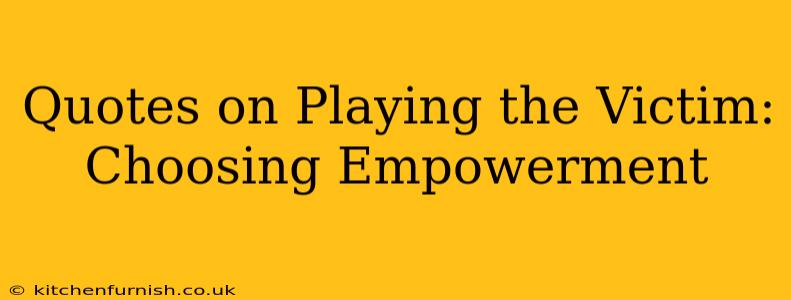We've all encountered the "victim mentality"—that tendency to dwell on misfortunes, blame external forces, and avoid responsibility. While acknowledging hardship is crucial, remaining stuck in a victim role hinders personal growth and empowerment. This post explores the insidious nature of victimhood through insightful quotes and offers a path toward reclaiming agency and self-determination.
What Does it Mean to Play the Victim?
Playing the victim isn't about genuinely experiencing hardship; it's about adopting a mindset that perpetually positions oneself as powerless and helpless. It's a defense mechanism, yes, but one that ultimately prevents growth and self-reliance. It manifests in various ways, from constant complaining and blaming others to seeking pity and avoiding accountability. The key distinction lies in response to adversity. Do you actively seek solutions, or do you remain entrenched in self-pity?
Powerful Quotes Illuminating the Victim Mentality
Several insightful quotes illuminate the pitfalls of playing the victim:
-
"The only person you are destined to become is the person you decide to be." — Ralph Waldo Emerson: This quote emphasizes the power of self-determination. Your future isn't predetermined by past experiences; it's shaped by your choices. Choosing empowerment means rejecting the victim narrative and taking control of your life's direction.
-
"The victim mentality is a self-fulfilling prophecy. If you believe you're a victim, you'll act like one, and the world will treat you like one." — Unknown: This quote highlights the cyclical nature of victimhood. Believing you are powerless reinforces that belief, creating a self-perpetuating cycle of helplessness. Breaking this cycle requires a conscious shift in perspective.
-
"It is not the strongest of the species that survives, nor the most intelligent that survives. It is the one that is the most adaptable to change." — Charles Darwin: While not explicitly about victimhood, this quote underscores the importance of adaptation and resilience. Life throws curveballs. The ability to adapt, learn from challenges, and evolve is crucial for overcoming adversity and escaping the victim mentality.
-
"Life is 10% what happens to you and 90% how you react to it." — Charles Swindoll: This classic quote directly addresses the power of personal response. While external events are beyond our control, our reactions determine our outcomes. Choosing empowerment means focusing on the 90% within our control—our reactions, choices, and perspectives.
How to Break Free from the Victim Mentality
Overcoming the victim mentality requires conscious effort and self-reflection. Here are some strategies:
-
Acknowledge your feelings, but don't dwell: It's okay to feel hurt or angry. Allow yourself to feel these emotions, but don't let them consume you. Process them, learn from them, and move on.
-
Take responsibility: Identify areas where you can take ownership of your life and circumstances. Even in challenging situations, there are often choices to be made.
-
Focus on solutions: Instead of dwelling on problems, focus your energy on finding solutions. Actively seek help, develop coping strategies, and take steps to improve your situation.
-
Practice self-compassion: Be kind to yourself. Recognize that setbacks are part of life and that you are not alone in your struggles.
-
Celebrate your strengths: Focus on your abilities and accomplishments. Recognize your resilience and capacity for growth.
Frequently Asked Questions (FAQs)
What are the signs of a victim mentality?
Signs include constant complaining, blaming others for misfortunes, seeking excessive sympathy, feeling helpless and hopeless, and avoiding responsibility for one's actions.
Can a victim mentality be overcome?
Absolutely! It requires conscious effort, self-reflection, and a commitment to personal growth. The strategies outlined above can help break the cycle.
How do I help someone with a victim mentality?
Encourage self-reflection, offer support without enabling, and gently challenge their perspective. Focus on empowering them to take ownership of their life and find solutions.
Is it wrong to feel like a victim sometimes?
It's perfectly natural to feel like a victim after experiencing hardship. The crucial distinction is not the feeling itself, but whether you allow that feeling to define you and dictate your actions.
By understanding the dynamics of victimhood and actively choosing empowerment, we can transform adversity into opportunities for growth, resilience, and a more fulfilling life. The journey toward empowerment begins with recognizing the power within and taking responsibility for our own destinies.

